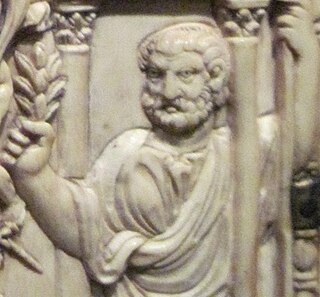Related Research Articles
Symmachus is a name from Roman antiquity. It may refer to:

Quintus Aurelius Symmachus signo Eusebius was a Roman statesman, orator, and man of letters. He held the offices of governor of proconsular Africa in 373, urban prefect of Rome in 384 and 385, and consul in 391. Symmachus sought to preserve the traditional religions of Rome at a time when the aristocracy was converting to Christianity, and led an unsuccessful delegation of protest against Gratian, when he ordered the Altar of Victory removed from the curia, the principal meeting place of the Roman Senate in the Forum Romanum. Two years later he made a famous appeal to Gratian's successor, Valentinian II, in a dispatch that was rebutted by Ambrose, the bishop of Milan. Symmachus's career was temporarily derailed when he supported the short-lived usurper Magnus Maximus, but he was rehabilitated and three years later appointed consul. After the death of Theodosius I, he became an ally of Stilicho, the guardian of emperor Honorius. In collaboration with Stilicho he was able to restore some of the legislative powers of the Senate. Much of his writing has survived: nine books of letters; a collection of Relationes or official dispatches; and fragments of various orations.

The gens Aurelia was a plebeian family at ancient Rome, which flourished from the third century BC to the latest period of the Empire. The first of the Aurelian gens to obtain the consulship was Gaius Aurelius Cotta in 252 BC. From then to the end of the Republic, the Aurelii supplied many distinguished statesmen, before entering a period of relative obscurity under the early emperors. In the latter part of the first century, a family of the Aurelii rose to prominence, obtaining patrician status, and eventually the throne itself. A series of emperors belonged to this family, through birth or adoption, including Marcus Aurelius and the members of the Severan dynasty.

Quintus Aurelius Memmius Symmachus was a 6th-century Roman aristocrat, an historian and a supporter of Nicene Christianity. He was a patron of secular learning, and became the consul for the year 485. He supported Pope Symmachus in the schism over the Popes' election, and was executed with his son-in-law Boethius after being charged with treason.
Quintus Clodius Hermogenianus Olybrius was a Roman politician, praefectus urbi of Rome from 368 to 370 and Roman consul in 379. Olybrius has been characterized as belonging to "the breed of flexible politicians who did well both under Valentinian I [...] and under Gratian."
Anicius Hermogenianus Olybrius was a politician and aristocrat of the Roman Empire.
Virius Nicomachus Flavianus was a grammarian, a historian and a politician of the Roman Empire.

Quintus Fabius Memmius Symmachus was a politician of the Roman empire, member of the influential family of the Symmachi.
Quintus Aurelius Symmachus was an aristocrat of the Western Roman Empire. He was appointed consul by the western court, together with general Flavius Aetius, in 446.
Aurelius Valerius Symmachus Tullianus was a Roman senator and aristocrat. He was appointed consul in 330 by the emperor Constantine.
Lucius Aurelius Avianius SymmachussignoPhosphorius was an aristocrat of the Roman Empire, and father of Quintus Aurelius Symmachus.

Lucius Valerius Septimius Bassus was a Roman politician.
The gens Anicia was a plebeian family at ancient Rome, mentioned first towards the end of the fourth century BC. The first of the Anicii to achieve prominence under the Republic was Lucius Anicius Gallus, who conducted the war against the Illyrii during the Third Macedonian War, in 168 BC.
Aurelius Anicius Symmachus was a politician of the Western Roman Empire belonging to the Roman families of the Anicii and of the Symmachi. In 415 he was proconsul of Africa and between 24 December 418 and January 420 he was praefectus urbi of Rome.

The gens Memmia was a plebeian family at ancient Rome. The first member of the gens to achieve prominence was Gaius Memmius Gallus, praetor in 172 BC. From the period of the Jugurthine War to the age of Augustus they contributed numerous tribunes to the Republic.
Flavius Paulinus was a Roman politician during the reign of Theodoric the Great, and was appointed consul for the year 498.
Lucius Aradius Valerius ProculussignoPopulonius was a senator and a politician of the Roman Empire, twice praefectus urbi of Rome and once consul.
The gens Mummia was a plebeian family at Rome. Members of this gens are first mentioned after the Second Punic War, and within a generation, Lucius Mummius Achaicus became the first of the family to obtain the consulship. Although they were never numerous, Mummii continued to fill the highest offices of the state through the third century AD.
References
- ↑ Martyn, John R. C. (2006-01-01). "A New Family Tree for Boethius". Parergon. 23 (1): 1–9. doi:10.1353/pgn.2006.0082. ISSN 1832-8334.
- ↑ Aurelius Memmius Symmachus v.c. emendabam vel distinguebam meum Ravennae cum Macrobio Plotino Euexodio, «I, Aurelius Memmius Symmachus, vir clarissimus , corrected and put punctuation to my copy in Ravenna together with Macrobius Plotinus Eudoxius, vir clarissimus» (Hedrick, Charles W., History and Silence, University of Texas Press, 2000, ISBN 0-292-73121-3, p. 183).